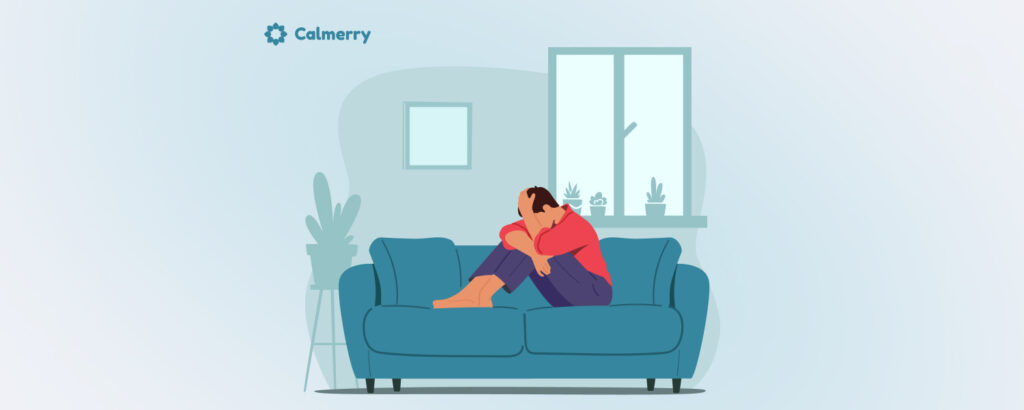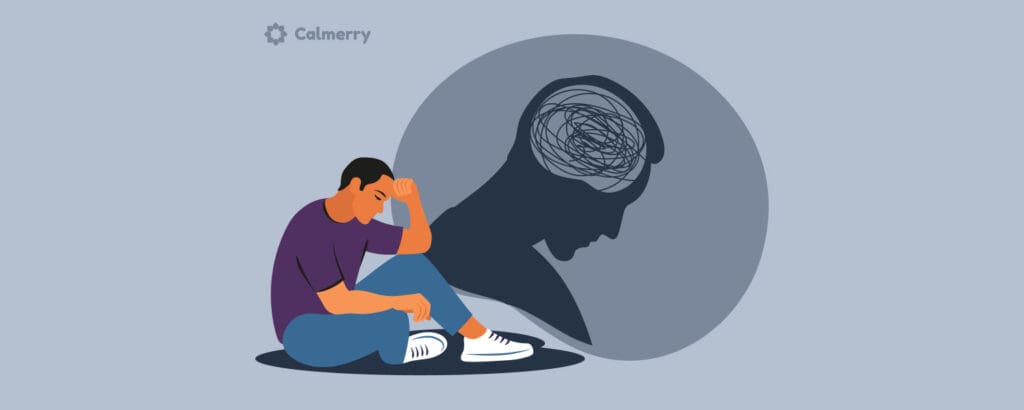Recognizing the Stress Symptoms in Men and How to Manage Them

In this article
Today, stress has become a common companion for many of us. However, the way it manifests and is addressed can vary significantly, especially between genders.
Men, in particular, often experience stress in unique ways that may not always be immediately apparent. This can be due to societal expectations, personal upbringing, or the reluctance to express emotional struggles.
Recognizing stress symptoms in men is the first step towards effective management.
It’s crucial to understand that these symptoms can be both physical and emotional, ranging from irritability and mood swings to physical fatigue and changes in sleeping patterns.
Common causes of stress in men

Different forms of mental or emotional pressure are usually the cause of stress, especially when pressure builds up to the point where you feel overwhelmed or not in control.
It’s not always easy to identify the exact cause of stress, but some of the most common examples would include:
- Expectations and societal pressure to fulfill certain roles or achieve certain statuses
- Financial insecurities, debts, paying bills
- Long working hours, pressure to perform, job loss, and retirement
- Divorce, caring for others, couple’s issues, and loneliness
- Injury and illness, either affecting you or a loved one
- Personal safety concerns or dealing with past trauma
- Balancing work-life demands, especially when trying to meet the needs of both career and family
- Navigating changes in social status or the expectations that come with aging
- Dealing with addiction or substance misuse, either personally or within one’s social circle
- Major life events like planning a wedding, having a baby, death of a loved one, or moving house
Stress symptoms in men
The signs and symptoms of stress in men can be physical, mental, and behavioral. Here’s a rundown of some of the most common symptoms to look out for.
Physical symptoms
- Low energy and fatigue
- Headaches
- Muscles aches and pain (back, neck, and chest)
- Erectile dysfunction
- Poor concentration
- Increased heart rate
- High blood pressure
- Upset stomach, diarrhea, or constipation
- Heartburn and indigestion
- Acne, rashes, eczema
- Hyperventilation
- More frequent colds and infections
- Excessive sweating
- Hair loss
- Restlessness
Mental and emotional symptoms
- Depression
- Anxiety
- Mood swings
- Irritability and anger
- Feeling overwhelmed
- Difficulty concentrating
- Forgetfulness
- Diminished sex drive
- Panic attacks.
- Feelings of worthlessness or hopelessness
- Obsessive or compulsive behaviors
- Increased suspiciousness
- Difficulty making decisions
- Confusion
Behavioral changes
- Alcohol or drug misuse
- Social withdrawal, avoidance, or isolation
- Gambling
- Smoking more
- Bad-tempered or aggressive
- Oversleeping or undersleeping
- Eating too much or too little
- Neglect of responsibilities
- Impulsive behavior
- Excessive gaming or internet usage
- Withdrawal from enjoyable activities
- Increased conflict with others
- Nail biting or other nervous habits
- Procrastination and avoidance of tasks
If you’ve been experiencing any of the symptoms above for a prolonged period, it’s worth seeking advice from a doctor or therapist.
This will ensure you get an accurate diagnosis, as many of these symptoms are also associated with other medical conditions and mental health disorders like clinical depression and anxiety.
What stress does to men? Does stress affect men differently?
Men and women often experience and respond to stress differently due to a combination of biological, social, and psychological factors. Let’s explore these differences.
Hormonal differences
When we’re stressed, our bodies release hormones like epinephrine and cortisol. These hormones are responsible for the “fight or flight” response, increasing blood sugar levels and blood pressure. Another hormone, oxytocin, often associated with calming emotions, is released as well.
Studies suggest that men generally produce less oxytocin than women during stress, which may influence how they cope with stress. [1] Takayanagi, Y., & Onaka, T. (2021). Roles of oxytocin in stress responses, allostasis and resilience. International Journal of Molecular Sciences, 23(1), 150. https://doi.org/10.3390/ijms23010150
Women, influenced by oxytocin and their reproductive hormones, may show a “tend and befriend” response, seeking and offering social support more often than men.
Yet, this is a nuanced field with ongoing research.
Gender differences in stress response
Men are more likely to exhibit a “’fight or flight” response to stress. This can mean they might not express their feelings openly, choose to withdraw from social situations, or even show increased aggression.
On the other hand, women might more frequently seek comfort in social interactions due to their higher oxytocin levels.
It’s important to remember, though, that everyone is different, and these are general trends rather than strict rules.
Men are less likely to seek help
Men are more likely to bottle up their stress, ignore their problems, or try to cope alone.
Men may feel ashamed to see a doctor or therapist because they feel pressured to act “tough” or “manly.”
As a result, some men choose unhealthy coping behaviors like alcohol and drugs, which can further increase stress and worsen mental health. It’s also a factor in the higher suicide rates observed among men. [2] Suicide Data and Statistics | Suicide Prevention | CDC. (n.d.). https://www.cdc.gov/suicide/suicide-data-statistics.html
Men’s health issues related to stress
When stress becomes chronic, it can eventually lead to serious health problems in both men and women.
For men, this includes an increased risk of cardiovascular disease, gastrointestinal problems, erectile dysfunction, and chronic pain. Recognizing and managing stress effectively is key to preventing these long-term health issues.
Can stress make a man distant?
Yes, stress can indeed impact a person’s behavior and emotional availability. When men are stressed, they may become more withdrawn and distant as a way of coping.
This reaction can be attributed to a variety of factors: societal expectations to manage problems independently or an instinctive “fight or flight” response.
It’s important for individuals and their partners to communicate openly about stress and find healthy ways to manage it together.
Why do men go silent when stressed?
Men may go silent when stressed due to a variety of psychological and social reasons. Often, it’s a learned behavior, where societal norms have taught men to internalize their problems and not express vulnerability.
Silence can also be a coping mechanism, as some men might feel they need to solve their issues on their own before they can engage with others.
Additionally, stress can lead to mental exhaustion, making communication feel more taxing.
Understanding and patience from loved ones, along with open communication, can help in these situations.
How men can manage and reduce stress
If you’re feeling overwhelmed by the daily pressures of life, try incorporating some of these activities into your daily or weekly routine.
1. Acknowledge your feelings
The first step is to acknowledge that, as a man, it’s perfectly normal and healthy to have emotions and to feel overwhelmed at times. Accepting your feelings without judgment can be a powerful step towards managing stress.
2. Redefine cultural norms
Challenge the traditional notions of toxic masculinity that often discourage men from expressing vulnerability. Embrace a healthier perspective where emotional expression and seeking help are viewed as strengths rather than weaknesses.
3. Learn stress management techniques
Techniques such as progressive muscle relaxation, deep breathing exercises, or visualization can be particularly effective for men. They offer practical tools to manage stress in the moment.
4. Nutrition and sleep hygiene
Pay attention to diet and sleep patterns. A balanced diet and adequate sleep are fundamental in managing stress and overall health.
5. Create a support network
Having a strong support network is crucial. This could be friends, family, your partner, or a support group where you can share your experiences and feelings.
6. Engage in physical activity
Regular exercise is a proven stress reliever. Exercise can also provide an emotional release and improve your mood through the release of endorphins.
7. Pursue hobbies and interests
Engaging in activities you enjoy can be a great way to relieve stress. Whether it’s a sport, a creative pursuit, specific interest, or a hobby, make time for these activities as they can provide a sense of accomplishment and joy.
8. Learn to say no
Overcommitment can lead to stress. It’s okay to set boundaries and say no to requests or obligations that are too much for you to handle. This is about respecting your limits and prioritizing your well-being. You deserve it!
9. Consider professional help if needed
If you find that stress is becoming overwhelming and is affecting your daily life, don’t hesitate to seek professional help. A therapist can provide you with a supportive space and tools and strategies to manage stress effectively and improve your mental health.
How can I comfort a man when they’re stressed?
- Listen actively – offer a listening ear without rushing to give advice. Sometimes, just being heard can be a significant source of comfort. Show that you’re listening by maintaining eye contact, nodding, and giving verbal acknowledgments like “I understand.“
- Acknowledge their feelings – validate their emotions by acknowledging that it’s okay to feel stressed and that his feelings are legitimate. Avoid minimizing their stress or comparing it with others’ experiences.
- Give them space if needed – some men may need a bit of space to process their feelings. If they seem to need time alone, respect that need while letting them know you’re available when they’re ready to talk.
- Help with practical solutions – if they’re open to it, help brainstorm practical solutions to the stressors they’re facing. Sometimes, discussing concrete steps to address the problem can reduce the feeling of being overwhelmed.
- Encourage professional help if necessary – if their stress seems severe or persistent, encourage them to seek support from a mental health professional.
Get professional help online
If you’re finding it difficult to cope with stress, and it’s negatively affecting your health or well-being, our online therapists here at Calmerry are always ready to lend an ear.
You can talk through your problems and experiences in a safe, confidential environment and get professional men’s therapy from our trained specialists.
Start with a brief survey – and get matched with your expert within 1 hour.
Takayanagi, Y., & Onaka, T. (2021). Roles of oxytocin in stress responses, allostasis and resilience. International Journal of Molecular Sciences, 23(1), 150. https://doi.org/10.3390/ijms23010150
Suicide Data and Statistics | Suicide Prevention | CDC. (n.d.). https://www.cdc.gov/suicide/suicide-data-statistics.html
online therapy
live video session



